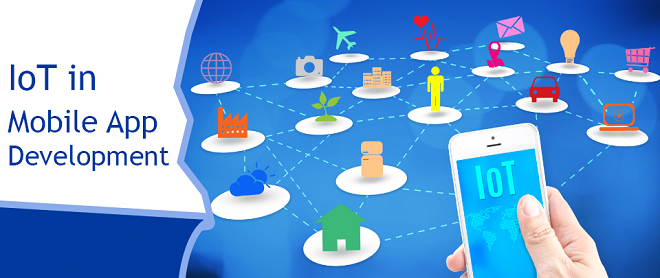The consistent advancement in the mobile application domain is happening due to several technologies, including IoT. As these technologies have made our lives simpler, it makes sense to dig deeper to understand how the mobile app is making the most of the IoT world. So, let’s read through to find out.
We live in an era heavily dominated by technology. The IoT (Internet of Things) is one such technology which has been growing over the years in terms of its areas of relevance, including the booming mobile app sector. In fact, most of us today are using mobile apps that already leverage IoT. For instance, a fitness app used across devices.
Experts say that the number of IoT devices and its applications are only going to increase in the future. As per a study, there would be about 18 billion IoT devices by 2022, out of which, 1.5 billion would have cellular connections. But let’s first explore what makes IoT stand out.
What Makes IoT Different From Other Technologies?
IoT is a network of digital machines, objects, and physical devices – all of which are interconnected to help share information through a variety of connectivity such as sensors and software. All these devices have distinct IP addresses and follow predetermined rules for information exchange across the network.
The connected devices remain synchronized at all times, making it possible to have seamless access to critical data. As a result, it becomes easier to make vital decisions in real-time. When integrated with a mobile app, the IoT system lets one have total control of all the devices, remotely, giving it an edge over other technologies.

For example, in an IoT environment, you can control your home lighting through a mobile app, as the app and lighting controls are IoT-enabled.
What are the Benefits of IoT Based Mobile App?
We just saw one example of an IoT-based mobile application. Now let’s explore what benefits such apps bring to the table.
- Convenience – With an IoT-based mobile app, one can control the entire IoT network through their fingertips, no matter where they are. The app can have notifications and social network integration, making it all the more convenient.
- Hassle-free customization – IoT technology provides room for the mobile app to be customized based on the connected devices’ requirement. So, the app can be unique, purposeful, and still rich in features.
- Increased security – As IoT largely deals with personalized information, the IoT-based mobile apps are designed to offer maximum security to the users.
- Integration – IoT is compatible with the majority of the emerging technologies like AI, ML, and VR, making it possible to build an app that integrates all such futuristic technologies efficiently.
How the Mobile App Development Industry is Leveraging IoT Technology
We already know how smartphones and apps have significantly simplified our lives. That simplification is being further streamlined through IoT integration in mobile apps. Wondering how? Let’s discover the ways the mobile app development sector is leveraging this technology.

Wearables
One of the widespread utilization of IoT system is in cloud-enabled wearable devices such as smartwatches, bands, or eyeglasses. The wearables are linked to a device through Bluetooth or Wi-Fi, facilitating an easy to-and-fro communication.
Smartwatch connected to your smartphone is an ideal example of IoT wearables. The watch notifies about texts and calls, monitors your sleep cycle, heart rate, counts your steps, and shares all the information with the app. The app synchronizes all this data and presents a clear picture of your overall health. With wearables like Fitbit, you can craft and manage your personalized fitness regime together with its app.
Healthcare and medicine
According to MarketResearch.com report, the market of healthcare IoT would cross $117 billion by next year. Currently, IoT is being used by healthcare and medicine sector for real-time remote monitoring and reporting, preventive care, chronic disease management, remote consultations, and research to name a few.
There are IoT-enabled devices as well, including infusion pumps, IVs, and vital sign monitors. The devices gather patient data through sensors and transmit through the app. IoT-based apps can also set medicine dosage through IVs and pumps, smoothing the process even further.
Smart homes
You can turn your home into a “smart home” by using IoT devices. The technology, leveraged by mobile apps, has made it possible for homeowners to keep an eye on their homes even when they are away.
With IoT-enabled devices, a variety of home appliances/features such as AC, lighting, and security can be controlled through a mobile application or IoT devices like Google Home and Amazon Alexa. Interestingly, these devices come with voice-control features and can learn from your data and preferences, automating the process over time.
Agriculture
As the world’s population continues to grow, the food demand is only going to rise. To meet it, it’s imperative for the agriculture sector to adapt to newer technologies such as IoT. In fact, IoT has already opened a way for intelligent farming.
IoT-enabled devices for this sector allows the farmers to monitor the condition of their fields, crops, livestock, temperature, light, soil conditions, and humidity through sensors. All this data can be collected in an app which can be reviewed by farmers to make informed farming decisions. In fact, smart farm drones are already in use for precision farming.
Retail
The retail industry is leveraging the IoT technology to enhance the experience of their customers. They collect information through IoT devices and use it to serve the customers better. For instance, infrared foot-traffic counters and predictive maintenance equipment.
In addition to that, IoT is also helping the retail sector with smart transportation of goods. As IoT devices utilize GPS, routes can be optimized to make the goods reach the destination faster and in an efficient manner via mobile apps. The devices can also track the vehicles carrying goods in real-time.
Conclusion
IoT is a technology to stay. Of course, there are going to be a lot more innovations and improvements in this technology. But it won’t be exaggerated to say that its application in the mobile app space would only grow with time. After all, the combination of both would make the everyday life of people more convenient in the future.
Author Bio:
Varsha Solanki is a Digital Marketing Strategist at Space-O Canada, a Software development company. She has 3 years of experience in the Information Technology industry. She spends her time reading about new trends in Digital Marketing and the latest technologies.

